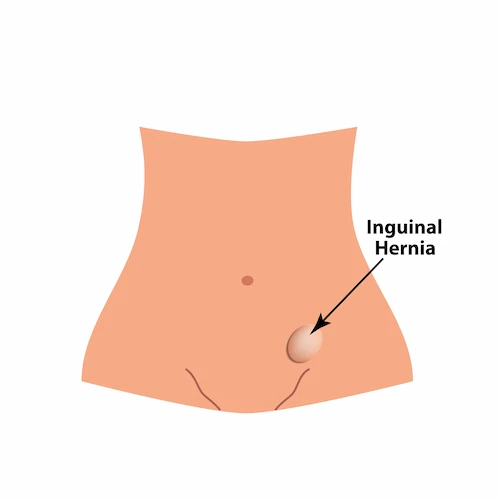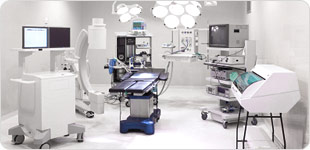Inguinal Hernia

An inguinal hernia is most common in men and boys, and appears in the groin
The experts at Hernia Center Los Angeles are some of the top hernia surgeons performing inguinal hernia repair in Los Angeles & Beverly Hills and will ensure that your hernia is properly diagnosed and treated.
- What is an Inguinal Hernia?
- Types of Inguinal Hernias
- Inguinal Hernias in Children
- Inguinal Hernia Causes
- Symptoms of an Inguinal Hernia
- Preparing for Inguinal Hernia Surgery
- Inguinal Hernia Treatment
- Recovery After Inguinal Hernia Surgery
- Frequently Asked Questions About Inguinal Hernias
What is an Inguinal Hernia?
Inguinal hernias are the most common type of hernia, accounting for roughly 75% of all hernias.1
An inguinal hernia occurs when abdominal contents, such as intestines, protrude through a weakened or torn abdominal muscle or connective tissue in the inguinal area. The inguinal area is located in the lower abdomen, just above the crease between the thigh and the abdomen. Inguinal hernias are more common in men than women and can occur at any age, from infancy to old age.

Types of Inguinal Hernias
There are two types of inguinal hernia: direct and indirect.
Direct Inguinal Hernia
A direct inguinal hernia occurs when abdominal contents protrude through a weakened abdominal muscle in the inguinal area. This type of hernia typically occurs in older men and is often associated with straining during bowel movements, heavy lifting, or chronic coughing.
Indirect Inguinal Hernia
An indirect inguinal hernia occurs when abdominal contents protrude through a weakened area of the abdominal wall, called the inguinal canal. This type of hernia is more common in infants and young children but can also occur in adults.
Inguinal Hernias in Children
Inguinal hernias are a common condition in children, particularly in infants and young children, and 90% of newborn inguinal hernias occur in boys.2
Inguinal hernias in children occur when a part of the intestine or other abdominal organs protrude through a weak spot in the abdominal muscles near the groin. The weak spot is usually present at birth and is a result of the development of the abdominal muscles during fetal development. In some cases, the hernia may be caused by a combination of a weak abdominal wall and increased pressure in the abdomen, such as during straining, coughing, or bowel movements.
Symptoms of inguinal hernias in children include:
- Bulge or swelling in the groin, often more prominent during crying or straining
- Pain or tenderness in the groin area
- Vomiting or nausea
- Inability to pass stool or gas
The treatment for an inguinal hernia in children is usually surgery, which involves pushing the protruding abdominal organs back into place and repairing the weak spot in the abdominal wall. The surgery is typically performed on an outpatient basis, and the child can usually go home the same day. The surgery is usually done under general anesthesia, and the child will need to fast before the procedure.
Inguinal Hernia Causes
In adults, inguinal hernias are usually the result of increased pressure that forces part of the intestines through a weak spot in the abdominal wall that surrounds the inguinal canal— straining during bowel movements, heavy lifting, coughing, sneezing or obesity.
Men are more likely to develop inguinal hernias because they have a greater likelihood of weakness in this portion of the abdominal wall than women.
Additional risk factors for inguinal hernias include:
- Pregnancy
- Age
- Family history of inguinal hernias
- Chronic constipation
- Premature birth and low birth weight in babies
- Previous inguinal hernia
Symptoms of an Inguinal Hernia
The symptoms of an inguinal hernia can vary depending on the severity of the hernia. Common symptoms include:
- A bulge or swelling in the groin or scrotum, sometimes accompanied by burning or aching
- Pain or discomfort in the groin area, especially when bending over or lifting
- A feeling of heaviness or pressure in the groin area
- Weakness or pressure in the groin area
- A feeling of heaviness in the testicles or scrotum
- Nausea and vomiting3
Preparing for Inguinal Hernia Surgery
The first step in preparing for inguinal hernia surgery is to attend a consultation with an experienced hernia surgeon from Hernia Center Los Angeles. Your hernia doctor will conduct a visual and physical examination as well as a review of your medical history, and imaging tests may be ordered. Your doctor will explain the details of your inguinal hernia surgery, then give you instructions for preparing for surgery, as well as what you can expect during the recovery period.
Inguinal Hernia Treatment
The treatment for an inguinal hernia will depend on the severity of the hernia and the symptoms experienced.
If an inguinal hernia is small and not symptomatic, a hernia doctor may recommend watchful waiting. A hernia belt may also help support the hernia and prevent it from increasing in size.
Surgery is often the recommended treatment for an inguinal hernia, particularly if the hernia is causing symptoms or is at risk of hernia strangulation. The surgery involves pushing the abdominal contents back into the abdominal cavity and repairing the weakened or torn abdominal muscle.4
Recovery After Inguinal Hernia Surgery
Recovery after inguinal hernia surgery can take several weeks, depending on the severity of the hernia and the type of surgery performed. After surgery, patients may experience some discomfort or pain, which can be managed with pain medications. Patients should avoid heavy lifting and strenuous activity for several weeks after surgery to allow the abdominal muscles to heal properly. In most cases, patients can return to their normal activities within four to six weeks after surgery.
Frequently Asked Questions About Inguinal Hernias
How is an inguinal hernia diagnosed?
A visual and physical examination can often help a doctor identify an inguinal hernia. Imaging tests such as X-ray, ultrasound, and CT scan may also be conducted to confirm an inguinal hernia diagnosis.
Is it necessary to have surgery if I have an inguinal hernia?
As with most hernias, if an inguinal hernia is not causing pain or other symptoms, your doctor may recommend watchful waiting. However, surgery may be necessary, especially in cases of a strangulated hernia or incarcerated hernia, which may be life-threatening.
What are the risks of inguinal hernia surgery?
Any surgical procedure has risks, but working with an experienced hernia surgeon is the best way to achieve a favorable outcome. Risks of hernia surgery may include:
- Infection
- Bleeding
- Organ and tissue damage
- Hernia recurrence
Contact Us
If you have been diagnosed with an inguinal hernia, please contact us to schedule a consultation with an experienced hernia doctor at Hernia Center Los Angeles where you will learn more about your treatment options.
1 Cleveland Clinic. Inguinal Hernia. Available: https://my.clevelandclinic.org/health/diseases/16266-inguinal-hernia/ Accessed April 20. 2023.2 Cleveland Clinic. Inguinal Hernia in Babies. Available: https://my.clevelandclinic.org/health/treatments/4337-inguinal-hernia-treatment-for-children. Accessed April 20, 2023.
3 Mayo Clinic. Inguinal Hernia. Available: https://www.mayoclinic.org/diseases-conditions/inguinal-hernia/symptoms-causes. Accessed April 20, 2023.
4 Johns Hopkins Medicine. Inguinal Hernia. Available: https://www.hopkinsmedicine.org/health/conditions-and-diseases/hernias/inguinal-hernia. Accessed April 20, 2023.



